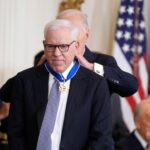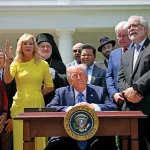

The following is an excerpt from the new biography Rhoda: “Comrade Kadalie, You Are Out of Order” by Breitbart News senior editor-at-large and in-house counsel Joel B. Pollak, which was released last week.
Rhoda was primarily known as a South African political activist, development expert, and columnist. Yet she was also an astute observer of U.S. politics, and befriended Andrew Breitbart before his passing in 2012.
Rhoda passed away last year after a struggle with cancer. Her life exemplified the ideals of Martin Luther King, Jr.: she struggled not only against racism, but also to transcend race, in service of higher ideals.
***
Rhoda Kadalie [was] a pioneering feminist, anti-apartheid activist, and human rights advocate who became an unlikely contrarian voice for both the South African opposition and the American conservative movement.
She [was] one of the most extraordinary and interesting political figures in South African history — and, indeed, the world.
A leader in the feminist movement within the broader black struggle against apartheid, Kadalie led the Gender Equity Unit at the University of the Western Cape — which describes itself today as a product of “radical black feminism” — and pushed for the inclusion of women’s rights in the emerging South African Constitution.
Appointed to the Human Rights Commission by then-President Nelson Mandela on an interim basis in 1995, and permanently in 1997, she became that body’s most visible and accomplished member, before resigning in protest at the government’s refusal to take the commission seriously, especially on socioeconomic rights.
She then created the Impumelelo Innovations Award Trust in 1999, an organization that identified and rewarded the country’s most successful social development programs across a wide spectrum of issues, touching every aspect of South African life.
Taking up her pen as a newspaper columnist, she became one of the few public figures with “struggle” credentials who were willing to challenge the ruling African National Congress (ANC) in the early years of South Africa’s democracy.
She became a leading voice against corruption, and she criticized the ANC’s failure to deal with the HIV/Aids pandemic, its coddling of Zimbabwean dictator Robert Mugabe, and its culture of conformity under President Thabo Mbeki.
…
By day, through Impumelelo, she helped the government pursue its development goals. By night, she was the government’s most feared critic, taking on South Africa’s obsequious media and corporate culture as well as the ruling party itself.
At one point, she was secretly offered the leadership of South Africa’s main opposition party, the Democratic Alliance — and she turned it down, preferring the integrity of her principles to the compromises that partisan politics would require.
In addition, Rhoda emerged a strong advocate for the pro-Israel cause, against the overwhelming weight of elite South African opinion. She also emerged as a staunch defender of U.S. President Donald Trump, in whom she saw a kindred anti-establishment spirit.
…
Rhoda’s commitment to her principles allowed her to see past identity politics, and beyond utopian ideals, and to focus on the human lives affected by concrete political outcomes. And her experiences in proximity to power — especially on the South African Human Rights Commission — convinced her that what was more urgent than the revolutionary ideals she hoped to achieve were the basic principles she wished to preserve.
It is liberating to discover, through Rhoda’s difficult journey, that the ideals upon which western civilization is based are still worth defending — though we ourselves have often failed to adhere to them, and are perhaps unworthy of them. Rhoda was a revolutionary because of the society into which she was born. Though she rarely used the term herself, she became something of a liberal — in the American sense, a conservative — because she discovered, after the revolution, that while the old order had failed to live up to the principles it had sometimes proclaimed, they were still worth preserving.
Critics often struggled to understand Rhoda’s political transition. To Rhoda, there was no “transition”: she fought for freedom throughout her life, particularly for women, whose oppression was overlooked in the old South African order and the new. Her conservative values, which became more pronounced later in her life, had always been latent, shaped by her Christian upbringing — and though she argued for reform within the church, she never abandoned her faith. The political turning points in her life were more like inflection points than wholesale changes: they were moments that accelerated her momentum in a direction she was already moving.
She fought apartheid, but opposed the post-apartheid government. She criticized that government, yet tried to help it achieve its socioeconomic goals. She focused on socioeconomic rights, but rejected socialism and looked to the private sector. She was a black feminist, and a Trump supporter. She was a committed Christian, and beloved by the Jewish community, which admired her and was grateful that she supported Israel. She believed in non-racialism, yet savored being Coloured [mixed-race].
Rhoda was one of a few leading South African figures to have experienced racism directly, and brutally, who could yet transcend the politics of race, clinging instead to the principles and institutions that might ensure justice for all. It was as if she had put western civilization to the test, examined its flaws, and decided that, on balance, its ideas and traditions were not only worth defending, but were urgently needed. The endurance of freedom depended as much on the preservation of what was right and necessary in our institutions as much as on overthrowing what had been proven wrong and prejudicial.
…
She knew that socialism, and identity politics, were the path to ruin, even if cloaked in the romantic rhetoric of liberation. “The point is delivery, not the race of the deliverer,” she wrote. Her stubborn insistence on principle embarrassed and frustrated former comrades; it was the rock on which friendships were dashed.
Rhoda understood, far sooner than most, that the ANC’s “national democratic revolution” was incompatible with constitutional democracy. And she warned an increasingly “woke” America: lest you be tempted by post-apartheid South Africa’s radical political example, you will suffer the same fate.
…
She did not place her faith in strictly political change — neither through the liberation offered by the ANC, nor the liberalism offered by the leading opposition party. And she measured politicians by their practical achievements — whether they improved the lives of the governed — rather than by the quality of their sentiments. Hence her respect for Trump, whose accomplishments shone despite his rhetoric.
Even as an ANC member, Rhoda wanted the South African government to have strong opposition, because she believed that the ANC would then be more successful in its objectives. She likened parliamentary opposition to a soccer match: “The stronger the opposing side, the more proficiently the defending team is likely to play.”
Opposition parties, in her vision, would not only hold the government accountable, but would also — ideally — offer alternative policies. To play that constructive role, it was important that opposition be as effective — and diverse — as possible: voters should not be denied any option, she believed.
Conversely, Rhoda believed, being a citizen in a democracy meant coming to terms with diversity. One did not have to agree with one’s opponents; one could even hate them and what they stood for; but one still had to engage, to cooperate, even to socialize together.
Rhoda was best known for attacking corruption — regardless of the culprit … In her own life, she exemplified principles of unimpeachable integrity. She had many offers to seize the spoils of struggle, as so many others had done. She turned down requests to join corporate “empowerment” boards; she declined most political appointments; she walked away from powerful positions rather than betray her principles.
…
Rhoda’s life is a lesson in how to live, politically: to seek truth everywhere, encourage debate, and celebrate difference — with a sense of righteous indignation against injustice, but always with a sense of humor, wherever possible.
Learn more about Rhoda, and about the new biography from UJ Press, at rhodakadalie.com.
Joel B. Pollak is Senior Editor-at-Large at Breitbart News and the host of Breitbart News Sunday on Sirius XM Patriot on Sunday evenings from 7 p.m. to 10 p.m. ET (4 p.m. to 7 p.m. PT). He is the author of the recent e-book, Neither Free nor Fair: The 2020 U.S. Presidential Election. His recent book, RED NOVEMBER, tells the story of the 2020 Democratic presidential primary from a conservative perspective. He is a winner of the 2018 Robert Novak Journalism Alumni Fellowship. Follow him on Twitter at @joelpollak.





